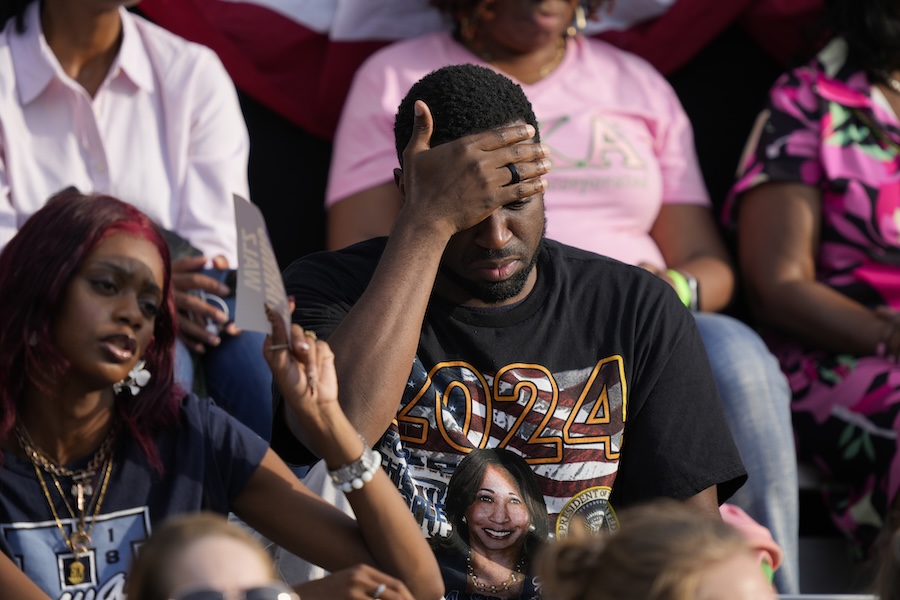There’s a particular kind of sadness that comes from knowing people have seen the worst of a man and decided it was good enough for them. Despite the fact that Donald Trump has effectively admitted to sexually assaulting women, incited an insurrection, and attempted to undermine the democratic process—and that’s just part of the story—more than half of American voters chose to stand behind him once again, even as he promised more of the same and worse.
I’ve spent time in the physical and emotional spaces where Trump’s words resonate, where they echo through church pews and fill the air like gospel. So many in these spaces are Christians, but their Jesus carries an American flag in one hand and a gun in the other. These are places where fear of “illegals” makes talk of mass deportations sound righteous and where the local prison isn’t just about public safety—it’s a livelihood. In these rural and small-town areas where economic opportunity is limited, it’s not difficult to see how a promise to “Make America Great Again” resonates, despite not being able to fully articulate when, exactly, America was great to begin with.
You may unsubscribe from any of our newsletters at any time.
But that doesn’t ease the grief of finding ourselves right back where we’ve been before. I don’t know about you, but in the past days my grief has been raw and messy, seething with sorrow and a quiet rage. And beneath it all, a lament that seems to have decided to make a home in my bones.
More on Broadview:
- How white Christian racism secured Trump’s victory
- 6 ways to find hope amid U.S. election despair
- Omer Aziz on the alarming rise of modern fascism in Canada
I’m afraid for my people south of the border. I’m afraid for what this means within the Canadian political landscape as well. It’s not about which party will win the next federal election but about how they’ll do it: through sound platforms, or through breeding scapegoats.
So many of us put our hearts and hands into shaping a world where peace, justice, and compassion might truly reign. We long to see glimpses of the Kingdom of God here and now, where love wades right into the mud and mess of it all, determined to heal what is broken and make us whole.
But in moments like these, when the values of so many are laid bare, it can feel as if all our efforts have been in vain. Or worse still, like we are standing alone in it all.
Elijah knew this feeling. After bringing down a host of false prophets, he found himself fleeing from Jezebel, driven into the wilderness with nothing but despair in his heart. He’d done everything. Given everything. But for what? To be hunted? Targeted? Alone and ragged, he came to a solitary broom tree, its spindly branches offering little shade but just enough cover to collapse beneath. He prayed for death, the kind of prayer a person says when they’re too tired to believe in answers but too broken not to ask. “I have had enough,” he says. “Take my life. I’m no better than my ancestors.”
But death didn’t come. Instead, sleep did. Deep and heavy, as if the earth itself cradled him in pity. He might’ve stayed that way forever, lost to the world, if it weren’t for the touch of an angel and the smell of baked bread on hot stones. “Get up and eat,” the voice said, like a mother coaxing a stubborn child. Elijah saw the bread and water waiting for him. He ate without a word, and then he fell back asleep. When he woke, the angel was there, insistent: Get up and eat, for the journey is too much for you.” So he ate and drank, and this time, something inside him shifted — just enough to move his feet. Just enough to keep going.
There is a place for lament, for letting grief wash over like an unrelenting tide, pulling us under and leaving us breathless. We need to sit with it, to feel the rawness of wounds that haven’t begun to close, to know the cost of what has been broken and what it means to live in a world where hatred is chosen… and then chosen again. Elijah knew this struggle. There was no strength left in him to rise, and so he lay there. There is no rising yet—only the ache of knowing what it means to have given everything and to feel it wasn’t enough.
Sometimes, we just need a nap and a cookie before we can keep going. But then, we rise. Perhaps tentatively. Perhaps tripping over our own feet. But we rise. Because what else is there to do?
Hope doesn’t ask for grand gestures or proclamations of faith renewed. It asks for the smallest acts—a bite of bread, a sip of water, the will to sit up. Hope does not come blazing, it flickers softly, stubbornly.
When Elijah reached Mount Horeb, he found a cave and made it his refuge. In that refuge, he raged. “I have been very zealous for the Lord,” he cried. “The Israelites have rejected your covenant, torn down your altars, and put your prophets to death with the sword. I am the only one left, and now they are trying to kill me too.” His lament was desperate. He laid it all bare—the exhaustion, the fear, the loneliness of standing against the tide.
And then came the wind—strong enough to shatter rocks. But God was not in the wind. Not this time. The ground trembled with an earthquake, shaking everything loose. But God was not there either. Fire blazed, wild and consuming. Still, there was no sign of God. Only after all this came a whisper, a reminder that the loud and the violent are not always the most powerful.
This is the space where hope, and love, reemerges. Not with trumpets or banners, but with the quiet resolve to listen and then to act. Not in grand displays but in daily, stubborn acts of care and resistance. There is work to do. There is care to give. There is love to offer, defiantly, persistently, until the world, and we, finally begin to change.
I am deeply joined with those who find themselves in the throes of grief and lament. We mourn together, knowing that God holds us close. There is no need to rush; grief must have its time. But once rested and renewed, I will first seek the quiet places where Spirit whispers. I will listen. I will rise and I will go.
***
Rev. Bri-anne Swan is the lead minister at East End United in Toronto.














Timely thought in brilliant prose.
Congrats Bri-anne!.
The last 3 elections has proved the fall of America. Neither party had a God fearing platform. It was to choose the lesser of two evils.
Daniel 2:21 and Romans 13:1 has a lot to say about the current leaders in America.
God is in control, whether for blessings or curses. We decide as a nation whether to live in sin or not. God is gracious enough to allow our decision to stand.